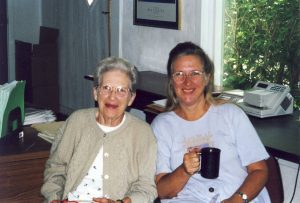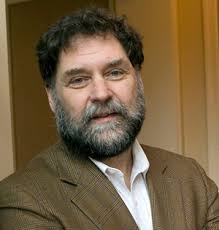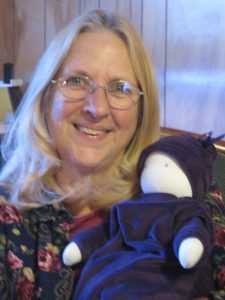The advantages of intergenerational programming are many, as illustrated throughout this newsletter! In this article I want to share that LifeWays Principles and Practices, including relationship-based care and creating an experience of home, are vital throughout the life span. Because you’re all getting older—or may already be dealing with your own parents’ aging and requiring more care—it’s helpful to realize that it’s similar at the end of life as at the beginning: our efforts to de-institutionalize childcare and make it more home like are echoed by the leading-edge work gaining momentum to de-institutionalize long-term care for elders and make it more home like. No kidding.

When my mother and mother-in-law could no longer live alone, I took care of both of them in our home for six years. That time was very rewarding and felt very spacious, but it wasn’t very intellectually stimulating for me as both ladies experienced increasing memory loss. So I managed to stay out of trouble by getting a Masters in Gerontology—I saw the University’s ad in the paper that said something like, “One night a week forever and you can…..” and they immediately had me!
I was able to put together an interdisciplinary masters in “Gerontology and Organizational Change” in order to focus on efforts to change long term care—just as I’ve been working toward changing childcare and birth. With this focus, I was able to plug into the national movement to change the culture of long-term care by making it resident centered, home like and relationship based. The Pioneer Network is a national leader of this movement to revolutionize care toward the end of life, just as LifeWays is a pioneer in working to change care in the early years.

One of the leaders in this movement is Dr. Bill Thomas, who developed The Eden Alternative to combat the “plagues” of loneliness, helplessness and boredom in nursing homes and assisted living facilities—by making them into living environments that include children, plants, pets and (most importantly) relationship-based care that is person-centered. In addition to welcoming visits by groups of children, these facilities often team with early childhood programs, providing both on-site care staff and inter-generational interactions for both children and elders.
In the past few years Bill Thomas has gone even further and said that these large institutions need to be replaced altogether by smaller homes designed for 10-12 elders maximum, who receive relationship-based care by what he calls “Shabazim” (a Persian word he uses, for lack of an English one, for caregivers who are cross-trained to do everything for and with the residents: cook, clean, tend to personal needs, etc.). The medical personnel go from home to home in the cluster as needed, and each resident has their own bedroom and bathroom, with a common kitchen, dining room and living room. The emphasis is that each home feels like a home instead of like an institution. Called “The Green House Project: Caring homes for meaningful lives,” it’s sparking new construction throughout the country.
I was disappointed that in all my research on leading-edge practices and creating community in long-term care, none of the gerontology databases contained any mention of the Steiner communities working in this field. So I will share with you that Fellowship Community—“a dynamic, work-based, inter-generational, long-term care community founded on the ideas of Rudolf Steiner’s Anthroposophy” in Chestnut Ridge, New York—has been pioneering this kind of caring community for over fifty years! Camphill Ghent is a newer innovative community for elders that is working out of Steiner’s indications and has received financial backing from the State of New York. Like Waldorf education fifty years ago, this work seems to be another “best kept secret”……

Rahima Baldwin Dancy, author of You Are Your Child’s First Teacher, is a former LifeWays board member now living and working with community at Silver Sage Senior Cohousing in Boulder, CO. Learn more from Rahima when you join her in her LifeWays online course, Bringing “Home” into Your Early Childhood Program!